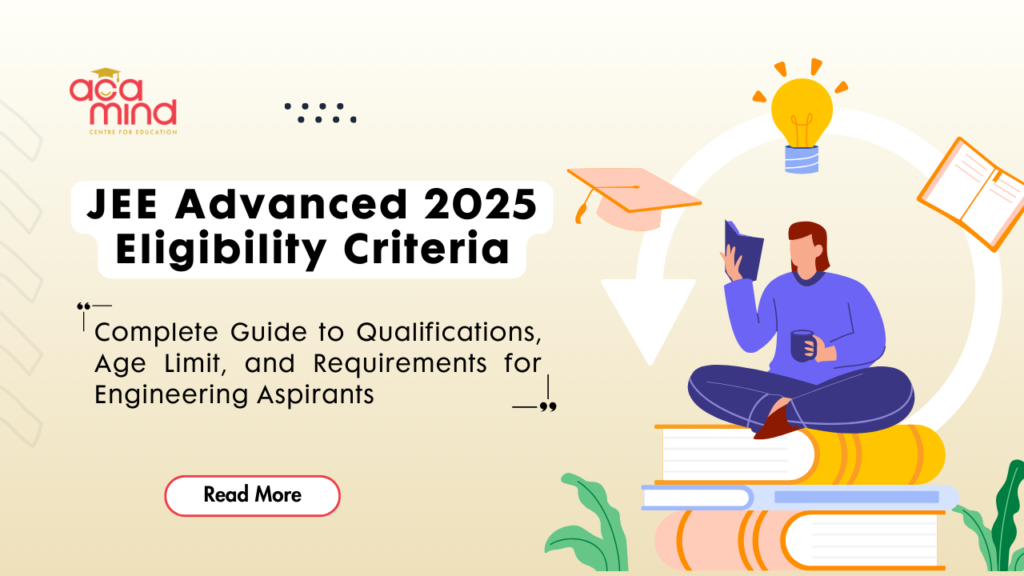Table of Contents
ToggleThe Joint Entrance Examination (JEE) Advanced is an essential step if you are aiming for the prestigious Indian Institutes of Technology, more commonly known as the IITs. However, before proceeding to the detailed preparations, let’s make sure that you qualify for the JEE Advanced 2025 eligibility criteria. Well, starting from knowing whether you are eligible for one of the most challenging tests in the country is half the battle won.
Let’s discuss in this blog JEE Advanced 2025 eligibility criteria to know if one can take the next big step in this academic journey.
1. Qualifying in JEE Main 2025
The first and foremost condition that a student has to fulfill is to pass the JEE Main exam. JEE Advanced is the second stage examination, and to get through this exam, a student needs to secure a good ranking in the JEE Main 2025 exam conducted by NTA. This means, for instance, that for every financial year, there is a certain cutoff rank that is decided so that those that scored above it are taken to the next level known as the Advanced stage.
For JEE Advanced 2025 eligibility criteria, there is a prerequisite of rank in JEE Main to be within the top 2,50,000 candidates only. This entails all categories of candidates: general, OBC, SC/ST, and others. However, it should be mentioned that the cutoff number is different every year and one should visit the official website of JEE for up-to-date information.
2. Age Limit
Age is another criteria for the JEE Advanced 2025 eligibility criteria. It is required that candidates should have been born on or after the 1st of October, 1999, except for the general category. However, the candidates belonging to SC, ST, and PwD categories are granted an additional 5 years of age relaxation, and therefore such candidates should have been born on or after 1st October 1994.
3. Number of Attempts
JEE Advanced is the type of examination that can be attempted two times but not consecutively. However, if you have appeared for JEE Advanced 2024, you can take the test again in 2025 only, and you are not allowed to appear again for this test after that. This means that the above restriction will apply regardless of whether you had done well or poorly in the previous attempt. Remember that you won’t have several attempts at this, so make sure you decide on your preparation strategy.
4. Appearance in Class 12 Exams
Your score in the Class 12 (or other equivalent examination) board examination is also one of the important criteria for appearing in the JEE Advanced exam. For instance, you must have done your Class 12 board examinations in either 2024 or 2025 to stand a chance. With the same logic, if you appeared for the examination in the year 2023 or before that, it will be impossible for you to attempt the JEE Advanced 2025. This rule makes sure that the candidates are freshly passed from high school so they can be in a position to handle the academic challenges they are likely to encounter at IITs.
It is expected that you have done your Class 12 examination and passed in the subjects Physics, Chemistry, and Mathematics. These subjects are the core subjects of not only the JEE Main examination but also the Advanced, so they cannot be omitted in order to be eligible for admission.
Common Qualifying Examinations Considered Equivalent to 12th Standard:
- The final examination of the 10+2 system conducted by any recognized Central/State Board.
- Intermediate or two-year pre-university examination conducted by a recognized Board/University.
- The final examination of the two-year course of the Joint Services Wing of the National Defence Academy.
- Senior Secondary School Examination conducted by the National Institute of Open Schooling (NIOS) with a minimum of five subjects.
- Any Public School/Board/University examination in India or abroad recognized as equivalent to the 10+2 system by the Association of Indian Universities (AIU).
- H.S.C. vocational examination.
- Diploma recognized by AICTE or a State Board of Technical Education of at least 3 years duration.
- Cambridge University High School Certificate Examination. (General Certificate Education (GCE) examination (London, Cambridge, or Sri Lanka) at the Advanced (A) level.)
- International Baccalaureate Diploma, after 10 years of schooling (High School Certificate Examination of the Cambridge University or International Baccalaureate Diploma of the International University of Baccalaureate Office, Geneva)
5. Minimum Percentage Requirement in Class 12
There was a minimum percentage criterion in Class 12 results for candidates to appear for JEE Advanced in earlier years. However, for JEE Advanced 2025, the requirement to secure at least 75% (or 65% for SC, ST, and PwD candidates) has been removed.. However, the only requirement is that you should have passed the Class 12 Board examination in the requisite subjects. This is good news to many students who may have performed poorly in their board exams but are so brilliant in competitive exams like JEE.
6. Previous Admission to IITs
If you have accepted the admission in any of the IITs through a previous attempt at the JEE Advanced exam or even if you are held a seat and withdraw later, then you will not be able to write JEE Advanced 2025. But in case you have been given a seat in IIT but have not joined the institute, you still can write the exam.
This rule is quite appropriate so as to give new intakes a chance to compete for the few available openings at the IITs in a given academic year.
7. Category-Based Reservation
As it is with most of the competitive examinations in India, the JEE Advanced 2025 eligibility criteria has provisions for the consideration of the reserved categories. This helps to make sure that all the candidates across the different social categories are given an equal opportunity to gain admission. Here’s a breakdown:
- General-EWS: 10% of the total seats are reserved for candidates from economically weaker sections.
- OBC-NCL: 27% of seats are reserved for candidates from the Other Backward Classes who do not fall into the creamy layer.
- SC: 15% of seats are reserved for Scheduled Caste candidates.
- ST: 7.5% of seats are reserved for Scheduled Tribe candidates.
- PwD: 5% of seats are reserved for Persons with Disabilities (across all categories).
These reservations are meant to promote equality and inclusivity, ensuring that students from different backgrounds have the opportunity to pursue an education at the IITs.
Why Meeting the Eligibility Criteria is Important
The eligibility criteria for JEE Advanced are strict for a reason. IITs also try to govern themselves at a very high standard of education, and JEE Advanced 2025 eligibility criteria ensure that only those students who deserve to get an education from those institutions. And, as has been said earlier on, if there is one criterion that has not been met, then one is not allowed to sit for the exam. Missing out on even one criterion means you won’t be allowed to sit for the exam, regardless of how well prepared you are otherwise.
Conclusion: Get Ready for JEE Advanced 2025
Preparing for JEE Advanced is a stressful task, but it begins with first checking whether you fulfill the JEE Advanced 2025 eligibility criteria. Whether you are qualifying for JEE Main, scoring well in your Class 12 board exams, or comprehending the age and attempt restrictions, everything counts for something. Every time you are preparing for an exam, it’s important to consider some of these factors to ensure you don’t encounter some surprises. Also, if there is anything you are not very clear about, it would be wise to consult with mentors, teachers, or any coaching institutions like Acamind Academy, one of the best education centres in Dubai, regarding exam preparations or eligibility. They can provide clarity and help you navigate this critical stage in your academic journey.








